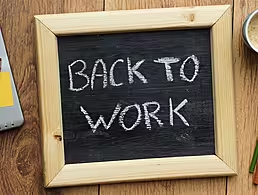Dr Deirdre O’Shea is a senior lecturer in work and organisational psychology at the Kemmy Business School at University of Limerick.
There are plenty of worrying statistics around mental health, burnout and stress in the workplace that show employees are struggling.
To take just one example, a recent report on workplace wellbeing shows that distressed employees spend more than a third of their time at work being unproductive and, on average, one full day off sick per month.
Does this mean we’re on the verge of a stress epidemic? To find out, I spoke to Dr Deirdre O’Shea about the worrying trends of burnout and stress in the workplace. O’Shea is a senior lecturer in work and organisational psychology at the Kemmy Business School at University of Limerick. “I am interested in how to enhance the experience of work,” she said. “I design daily interventions which can impact wellbeing and motivation.”
O’Shea said through her education she decided to focus on organisational psychology because she is fascinated by the world of work and the major part it plays in most of our lives. “Work has the potential to enhance our lives, give us a sense of meaning, purpose and success, but can also be the source of much stress and strain,” she said.
Looking at the world of work as a whole, there are some changes and trends emerging that O’Shea has noticed, including the speed at which we are expected to process information. “This is related to a concept called cognitive load, and it means that we have to process a much greater amount of information in a much shorter period of time. This can affect concentration (we flit from one thing to another) and may have an impact on our ability to be really creative, although more research is needed on this.”
She also noted that the globalisation of products and services has changed the way many organisations work. While a 24/7 approach may appear to contribute to the dreaded ‘always on’ culture, O’Shea sees how it can have a positive effect of forcing companies to treat their employees better. “Consumers can literally shop the entire world to get the best prices for goods and services. This means that, as consumers, we need to pay much more attention to the corporate social responsibility of companies and, in particular, how they are treating and compensating their workers.”
The stress epidemic
While there are a lot of statistics that point towards a more stressed workforce, O’Shea isn’t so sure the number of stressful situations has actually risen. She pointed out that our working conditions, at least in developed countries, have never been better protected. “We have laws regarding working time, minimum pay, work breaks, protection of contracts etc,” she said.
“However, we also have expectations about what our work and jobs should be about, what they should provide for us, what work and how much work we should be required to provide in return. When our expectations are not met, we feel like we are not being treated fairly, that we cannot trust our employers, and this can be stressful.”
She also noted there is an expectation that workers’ jobs should be meaningful and rewarding. “We conducted research demonstrating that focusing on the positive meaning of one’s work for even five minutes a day can decrease emotional exhaustion and fatigue.”
‘Workplace wellness programmes are a popular initiative but unfortunately do not have much evidence to indicate their effectiveness’
– DEIRDRE O’SHEA
One of the most well-documented culprits of current workplace stress levels is the aforementioned ‘always on’ culture. While the separation of work and home life has been ingrained in us for decades, O’Shea said this notion has been challenged in recent years with technology that keeps people connected – and it’s not always clear where the boundary is.
“Responsibility for this lies with both the employee and the employer. An employer should not place strong expectations on employees to be available for work outside of their working times,” she said, adding that employers need to be especially cognisant of expectations in light of a recent Labour Court ruling, which found that being expected to deal with out-of-hours emails is a breach of the Working Time Act in certain circumstances.
O’Shea also mentioned a caveat attached to workplace wellbeing programmes. “Workplace wellness programmes are a popular initiative but unfortunately do not have much evidence to indicate their effectiveness. They do demonstrate that an organisation ‘cares’ enough for its employees to put in place activities and strategies to help them stay well when they work, and the importance of this should not be dismissed,” she said. “However, to really tackle wellbeing in the workplace we need to take a dynamic approach and recognise the day-to-day fluctuations in wellbeing and performance, and understand what affects these.”
Advice for employees
As always, while there is responsibility on the employer side of things, employees must take ownership of their own stress levels, too. O’Shea warned that since burnout is an end state to stress and not something that happens overnight, there are plenty of warning signs that employees should be aware of before they become completely burnt out.
“The first step is to recognise what is causing the stress. Diagnosing the source of an individual’s stress is a really important first step to tackling it,” she said. “We also need to consider the boundaries between work and non-work, and maintain a level of separation between these. For example, simple things like taking work email off one’s personal phone can be effective.”
Stress is not always consistent with how, when or why it presents itself. “There are some days when we are full of energy and our work tasks seem easy, and other days when we are tired or under pressure and the same tasks seem like a much higher workload,” said O’Shea. “Our research tries to look at these and figure out ways to maintain or restore workers’ energy and motivation for work, even on days when it seems overwhelming.”
Want stories like this and more direct to your inbox? Sign up for Tech Trends, Silicon Republic’s weekly digest of need-to-know tech news.




